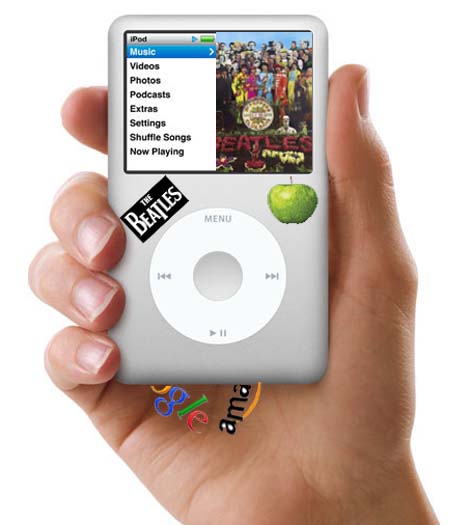Why Google lost the Beatles to Apple (and an Android Achilles Heel)

Although Apple's little teaser on their website this weekend would have suggested something even more extraordinary than the addition of the Beatles library to iTunes, it remains a big deal to fans and music executives alike. It also ends years of legal wrangling between Apple and the Beatles (along with EMI, the digital rights holder for the songs). What's more interesting to me, though, is what it says about Google and Android's de facto partner for digital content, Amazon: You can apparently sell all the phones and devices you want, but Apple still dominates digital entertainment.

By the end of the summer, the three contenders [Apple, Amazon, and Google] for the Beatles deal were approached about the availability of the digital rights.
After rapid negotiations involving Apple Corps [the music group run by Beatles estates, not the iPod maker] CEO Jeff Jones, EMI's [Roger] Faxon and Steve Jobs' Apple, a deal was hatched and the parties set about planning the announcement and getting marketing materials together the week before the holiday shopping season starts in earnest...One music executive said: "Who else are they going to do a deal with? Apple dominates the digital market."
Although the deal is only exclusive with Apple/iTunes through 2011 and actual details weren't disclosed, even Apple's typical cut of around 25% of iTunes sales spells big money and bigger prestige. 11 of the top 25 albums on iTunes this morning were Beatles material, including the $149 box set which was sitting at #11. Reviewers in the iTunes store were generally over the moon:
Big thanks to Steve Jobs for his persistence in getting these tracks for the iTunes Store...Arguably the greatest catalog in the history of rock and roll, all in one place - A MUST BUY...Awesome box set - How about a Beatles Collectors iPod?"
Beatles Collectors iPod indeed.
Amazon and Google didn't stand a chance. This says a lot, actually, about the market position of the iPhone (and the iPod and Apple TV, although these are a bit less important to Google). If all of your music lives in iTunes because Apple so thoroughly dominates this market and you bought an iPod 3 years ago, what sort of phone are you going to buy? Maybe an Android if you have some compelling reason to do so, but the iPhone starts looking awfully attractive when you'd like to manage all of your digital content in one place.
In fact, if you want your phone to also be your music player (and why wouldn't you?), then what would you rather do? Buy all of your music (and movies and TV shows) through iTunes and sync everything automatically to your iPhone and iPad? Or find your MP3s, mount your Android device, copy the music (and videos) to the device, unmount the device, use an App to find all of your content, and then play it? Some device manufacturers have software to make it easier, but Apple obviously has a giant advantage in this sort of convergence.
You can certainly buy a lot of digital content through Amazon on your Android phone, but you won't be buying any Beatles albums, will you?
Why did Google and Amazon lose out? Because it's all about the ecosystem. Until Google has a desktop or even browser-based application that can integrate with various digital content sources and automagically get all of that content onto your Android devices and Google TV, Apple will have the advantage. A big advantage. This Beatles deal, whether you love the Fab Four or not, proves that.